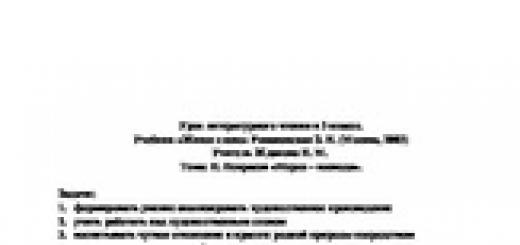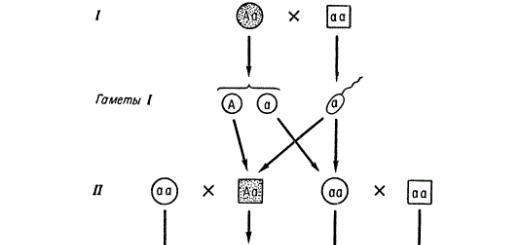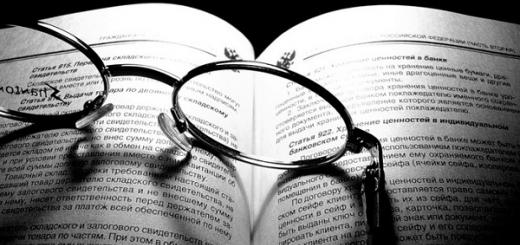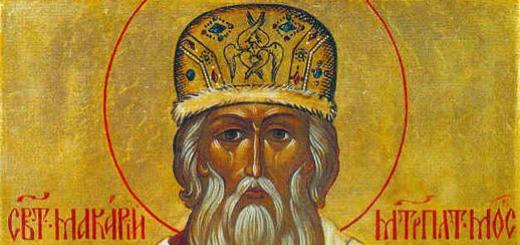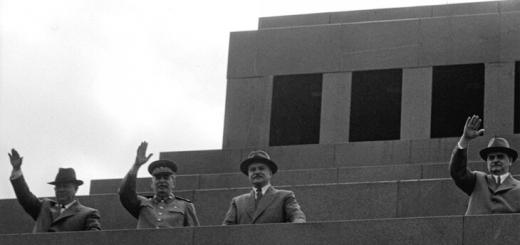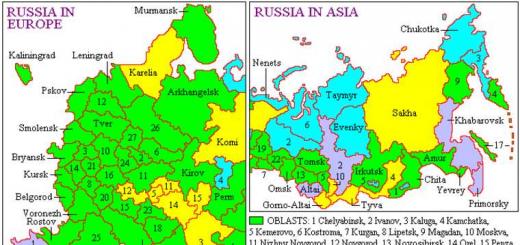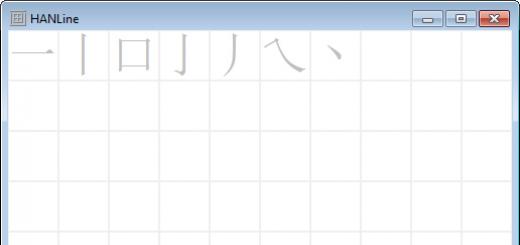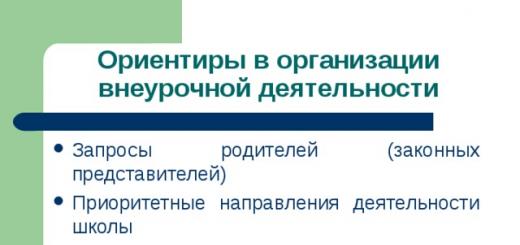N. Nekrasov
Frost is a governor.
It is not the wind that rages over the forest,
Streams did not run from the mountains,
Moroz - commander of the patrol
Walks around his possessions.
Looks to see if the snowstorm is good
The forest paths have been taken over,
And are there any cracks, crevices,
And is there any bare ground somewhere?
Are the tops of the pines fluffy?
Is the pattern on oak trees beautiful?
And are the ice floes tightly bound?
In great and small waters?
He walks - walks through the trees,
Cracking on frozen water
And the bright sun plays
In his shaggy beard.
. . . . . . . . . . . . . . .
Climbing up a large pine tree,
Hitting the branches with a club
And I’ll delete it to myself,
Sings a boastful song:
. . . . . . . . . . . . . . .
"Blizzards, snow and fog
Always submissive to Frost,
I'll go to the seas and oceans -
I will build palaces from ice.
I'll think about it - the rivers are big
I'll hide you under oppression for a long time,
I will build ice bridges,
Which ones the people will not build.
Where are the fast, noisy waters
Recently flowed freely -
Pedestrians passed by today
The convoys with goods passed.
. . . . . . . . . . . . . . . .
I'm rich, I don't count the treasury
But goodness is not lacking;
I'm taking away my kingdom
In diamonds, pearls, silver..."

Literary reading lesson in 3rd grade.
Textbook “The Living Word” Romanovskaya Z. I. (Moscow, 2003)
Teacher Zhdanova N.M.
Topic: N. Nekrasov “Frost is a governor.”
Tasks:
1. develop the ability to analyze a work of art
2. learn to work on artistic words
3. cultivate a sensitive attitude to the beauty of native nature through
artistic word and image
Lesson objectives:
1. expand the reader's horizons
2. develop the ability to pay attention to artistic language
works
3. develop the aesthetic sensitivity of children
4. develop speech, enrich vocabulary
5. get emotional pleasure from reading works of fiction
6. discover the secret of Nekrasov’s poetry
Equipment: exhibition of books about winter, children's drawings, paintings and calendars about winter, textbook
"Living Word", Dahl's explanatory dictionary.
During the classes:
Organizing time.
Today in the lesson we will try to compare the creativity of writers and artists, as well as
Let's try to discover the secret of Nekrasov's poetry. And for this, let's remember what is necessary
What should I do in class to make it successful? (you need to be careful, be able to select
synonyms, epithets, actively participate in conversations, read expressively...) Well done, and also
you need to develop your memory, imagination and speech. Now we will work on this.
Warm up. (text written on the board)
Children, read the poem out loud expressively.
The snowball is fluttering, spinning,
It's white outside.
And puddles turned
In cold glass.
(Children read in chorus) Read the poem again to yourself and listen to the task. A
The task is this: I’ll give you a minute of time, you need to memorize the poem, and then
reproduce write in your reading notebook. (Children complete the task) Which of you wishes
read expressively what you wrote down? (survey of 57 children, not only willing ones) Well done, everyone
we tried. But some people are still not very good at it, which means that they need to
train to read expressively not only reading works, but also other works

subjects. After all, how you understand what you read depends on expressiveness. Maybe,
Preparing at home, you spent more time expressing yourself. Let's check it out.
Checking homework.
What piece did you prepare at home? (The work of F. Tyutchev “The Enchantress in Winter...”
for expressive reading) Read expressively the most striking passage that
made a lasting impression on you. (56 students read passages:
Enchantress in Winter
Bewitched, the forest stands -
And under the snow fringe,
motionless, mute,
He shines with a wonderful life.
And he stands, bewitched,
Not dead and not alive...
Nothing will tremble in him,
It will all flare up and sparkle
Dazzling beauty.)
Who wants to read the work in its entirety, expressively, try to convey the mood
the author or your mood? (Read by 23 students)
With what feeling does the poet write about winter? (he is surprised, admires, rejoices, admires
pictures of nature. The poet is fascinated by the beauty of nature.)
Together with the poets, we tried to understand the beauty of nature through poetry. Now look
Like photographers, artists captured winter on their canvases. (showing winter landscapes from
calendars and in paintings) What kind of winter is it like for Tyutchev and photographers and artists? (Enchantress,
Magician, Sorceress, Russian beauty winter, tender, beautiful, snow-white)
You are right, we see winter as light, graceful, and working wonders. Winter has appeared before us
light and pleasant. But is she always like this? (no, it can be harsh, and frosty, and
blizzard) remember the riddle with which we have already met: “What kind of master is this?
glass and leaves, and grass, and thickets of roses?” Who is this riddle about? (about frost) As in
Is the riddle named frost? (they call him a master, a wizard) But the poet N. Nekrasov decided
call him Moroz - governor. A voivode was the leader of an army in old times in Rus'.
(from the explanatory dictionary)
Work on the work “Frost - Voivode” by N. Nekrasov
Now we are about to get acquainted with this wonderful work. Everyone stood up
prepared to listen. (after reading, the children sit at their desks) Reading by the teacher. (separate
The lines are reread to show the power of Frost:
Moroz - commander of the patrol
Walks around his possessions.
Looks to see if the snowstorm is good
The forest paths have been taken over,
And are there any cracks, crevices,
And is there any bare ground somewhere?
He walks - walks through the trees,
Cracking on frozen water
I'll go to the seas and oceans -
I will build palaces from ice.

I'll think about it - the rivers are big
I’ll hide you under oppression for a long time...)
In the text we came across new unfamiliar words, the meaning of which needs to be clarified. For this
you need to match the words of the definition with the required meanings:
Go around on patrol Check, go to inspect
Shaggy beard
Mace
The seas are okiyany
Under oppression
Convoys with goods
Coffers
Does not become scarce
Uncombed, matted beard
Type of club, weapon of Russian heroes
Old Russian name, pronunciation of the word ocean
Press (something heavy)
Collection of carts (carts) for transporting goods
Money, specie, income, property
Doesn't get poor, doesn't run out
How is Frost depicted in this poem? Read these lines - what do you hear in
them?
(Moroz is the commander of the patrol
Walks around his possessions.
Looks to see if the snowstorm is good
The forest paths have been taken over,
Vigilant, attentive, careful in his work
He walks - walks through the trees,
Cracking on frozen water
And the bright sun plays
In his shaggy beard.
And I’ll delete it to myself,
Sings a boastful song
. . . . . . . . . . . . . .
I will build ice bridges,
Which ones the people will not build. –
Majestic, important, powerful
sometimes cheerful, mischievous, braggart
proud of the work done
I'm rich, I don't count the treasury
But goodness is not lacking;
I'm taking away my kingdom
In diamonds, pearls, silver...

Read the work again to yourself. (children read) How does life live for Moroz, the governor in
winter kingdom? (Wonderful. He does all sorts of magic and sings his boastful song.)
Let's read this song again. (read) How does the poet feel about his hero? (He
admires him, admires him).
Homework.
P. 236237 learn the passage by heart (up to the line: “he sings a boastful song” or the song itself),
You will need to read it in such a way as to express your attitude towards the governor.
Assessment.
Lesson summary.
What unites the poets’ poems about winter? (love of nature, ability to see it
beauty and convey it using the magic words of colors). What secret does poetry hide?
Nekrasova? (you can’t live in the world without magic. Every hero is special)
Frost the Voivode
It is not the wind that rages over the forest,Streams did not run from the mountains,
Moroz the voivode on patrol
Walks around his possessions.
Looks to see if the snowstorm is good
The forest paths have been taken over,
And are there any cracks, crevices,
And is there any bare ground somewhere?
Are the tops of the pines fluffy?
Is the pattern on oak trees beautiful?
And are the ice floes tightly bound?
In great and small waters?
He walks, walks through the trees,
Cracking on frozen water,
And the bright sun plays
In his shaggy beard.
Climbing up a large pine tree,
He hits the branches with his club,
And I’ll delete it to myself,
Sings a boastful song:
"Blizzards, snow and fog
Always submissive to the frost,
I'll go to the seas and oceans -
I will build palaces from ice.
I'll think about it - the rivers are big
I'll hide you under oppression for a long time,
I will build ice bridges,
Which ones the people will not build.
Where are the fast, noisy waters
Recently flowed freely,
Pedestrians passed by today
Convoys with goods passed...
I am rich: I don’t count the treasury,
And everything is not lacking in goodness;
I'm cleaning up my kingdom
In diamonds, pearls, silver."
The snowball is fluttering and spinning
The snowball is fluttering, spinning,
It's white outside.
And puddles turned
In cold glass.
Where the finches sang in summer,
Today - look! -
Like pink apples
There are bullfinches on the branches.
The snow is cut up by skis,
Like chalk, creaky and dry,
And the red cat catches
Cheerful white flies.
Sasha
In the winter twilight, nanny's talesSasha loved. In the morning in the sled
Sasha sat down, flew like an arrow,
Full of happiness, from the icy mountain.
The nanny shouts: “Don’t kill yourself, dear!”
Sasha, pushing your sled,
He runs merrily. At full speed
The sled is on one side - and Sasha is in the snow!
Your braids will come loose, your fur coat will become disheveled
Shakes off the snow, laughs, little dove!
The gray-haired nanny has no time for grumbling,
She loves her young laughter
Little man with a marigold
Once upon a time in the cold winter timeI came out of the forest; it was bitterly cold.
I see it's slowly going uphill
A horse carrying a cart of brushwood.
And walking importantly, in decorous calm,
A man leads a horse by the bridle
In big boots, in a short sheepskin coat,
In big mittens... and he's as small as a fingernail!
“Great, lad!” - Move past! —
“You’re so formidable, as I can see!
Where do the firewood come from? - From the forest, of course;
Father, you hear, chops, and I take it away.
(A woodcutter's ax was heard in the forest.) -
“What, does your father have a big family?” —
The family is big, two people
Just men: my father and I... -
“So there it is! What’s your name?”
- Vlas. - “What year are you?” —
The sixth has passed...
- Well, dead! - the little one shouted in a deep voice,
He pulled the reins and walked faster.
In the poem "Frost, Red Nose" Nekrasov touched upon the deep layers of our culture, an inexhaustible source of endurance and strength of the people's spirit, which saved Russia so many times in times of national upheaval.
Nikolay Nekrasov.
"It is not the wind that rages over the forest..."
From the poem “Frost, Red Nose.”
It is not the wind that rages over the forest,
Streams did not run from the mountains -
Moroz the voivode on patrol
Walks around his possessions.
Looks to see if the snowstorm is good
The forest paths have been taken over,
And are there any cracks, crevices,
And is there any bare ground somewhere?
Are the tops of the pines fluffy?
Is the pattern on oak trees beautiful?
And are the ice floes tightly bound?
In great and small waters?
He walks - walks through the trees,
Cracking on frozen water
And the bright sun plays
In his shaggy beard.
The path is everywhere for the sorcerer,
Chu! The gray-haired man comes closer.
And suddenly he found himself above her,
Over her head!
I climbed a big pine tree,
Hitting the branches with a club
And I’ll delete it to myself,
Sings a boastful song:
“Take a closer look, young lady, be brave.
What a governor Moroz is!
It's unlikely that your boyfriend is stronger
And it turned out better?
Blizzards, snow and fog
Always submissive to Frost,
I'll go to the sea-oceans -
I will build palaces from ice.
I'll think about it - the rivers are big
I'll hide you under oppression for a long time,
I will build ice bridges,
Which ones the people will not build.
Where are the fast, noisy waters
Recently flowed freely -
Pedestrians passed by today
The convoys with goods passed.
I love in deep graves
Dressing the dead in frost,
And freeze the blood in my veins,
And the brain in my head is freezing.
Woe to the unkind thief,
To the fear of the rider and the horse,
I love it in the evening
Start a chatter in the forest.
Little women, blaming the devils,
They run home quickly.
And the drunk, and on horseback, and on foot
It's even more fun to be fooled.
Without chalk, I’ll whiten my whole face,
And your nose will burn with fire,
And I’ll freeze my beard like that
To the reins - even chop with an axe!
I'm rich, I don't count the treasury
And everything is not lacking in goodness;
I'm taking away my kingdom
In diamonds, pearls, silver.
Come into my kingdom with me
And be the queen in it!
Let's reign gloriously in winter.
And in the summer we will fall asleep deeply.
Come in! I’ll take a nap, warm you up,
I’ll take the palace to the blue one...”
And the governor stood over her
Swing an ice mace.
Addressing the life and everyday life of ordinary people in his work, Nikolai Nekrasov never sought to embellish them. On the contrary, he tried to show in what slavish and incredibly difficult conditions the peasants live, forced to earn their living through hard physical labor. Nekrasov's poems, dedicated to serfs, are filled with pain and compassion. At the same time, the poet constantly wonders why the world is so unfair and dreams of changing it.
Most of the poems dedicated to representatives of the lower strata of society were created by Nekrasov in his mature years, when he had already said goodbye to his youthful illusions and realized that his noble spiritual impulses would not find a response in modern society. However, the poet could not and did not want to come to terms with the inequality that he saw around him. But all that remained for him was to capture in his works unpleasant scenes from the life of peasants, trying at least in this way to open people’s eyes to the fact that the other side of luxury and prosperity is poverty, hunger and disease.
Lesson objectives:
- continue to introduce children to the world of 19th-century poetry, enriching their reading experience and helping them become full-fledged readers;
- to ensure children’s full perception of N.A.’s poem. Nekrasov “Moroz the Voivode”;
- help students understand the structure, theme of the text and the specifics of its literary form (genre);
- explore the content and language of the work;
- bring children into the position of the author;
- to form the reader’s position by involving students in emotional and creative activities;
- ensure the formation of literary concepts and reading skills;
- implement a system of working on the skill of expressive reading of N. A. Nekrasov’s poem “Frost is a governor”;
- develop and enrich speech, thinking, memory, imagination of students; broaden their horizons;
- cultivate interest in classical literature and poetry of the 19th century;
- cultivate a love for Russian nature;
- contribute to the preservation and strengthening of the mental and physical health of students.
Equipment:
- portrait of N.A. Nekrasova,
- presentation on the topic of the lesson,
- computer,
- multimedia projector,
- screen,
- painting by V. Vasnetsov “Three Heroes”,
- drawing of Frost the Voivode,
- drawing of a big cheerful sun,
- drawings of a little cheerful and sad sun,
- exhibition of books with works of 19th century poets,
- reminders on determining the theme and genre of a work, on preparing for expressive reading,
- sheets of white paper,
- colour pencils,
- rulers,
- tablets with new words from the text, with the names of figurative language means: personification, metaphor, epithet, comparison,
- Ozhegov's explanatory dictionary.
During the classes
1. Psychological mood of students.
It’s winter outside, the sun has been covered by snow clouds, but in our hall there is a bright and beautiful sun, it looks at you and stretches its rays to your cheeks.
Smile back at him, and you will immediately feel warmer and more cheerful! Now imagine that your palms are a small mirror, look into it, smile at yourself - you see how cute and smart you are! Look at each other, smile, and your mood during the lesson will be cheerful and upbeat, you will want to learn new things, because it is so interesting!
2. Preparation for the perception of N.A.’s poem. Nekrasov “Frost the Voivode”.
1. Working with a book exhibition.
Guys, look at the exhibition of books and think about what you can call it? (Poetry of the 19th century) - Which works of 19th century poets did you remember and read with pleasure?
Let's look at the exhibition again. Which author's books occupy a central place on it? Why? (These are books with the works of N.A. Nekrasov, since we got acquainted with his work in previous literary reading lessons.)
Today in class we will talk again about the creative path of the great poet Nikolai Alekseevich Nekrasov, we will continue to study and research his works. /Slide 1 /
Which works of Nikolai Alekseevich Nekrasov are already familiar to you? /Slide 2 /
3. Statement of the topic and purpose of the lesson.
Today we will read another work by Nikolai Alekseevich Nekrasov, which is called “Frost - Voivode”, define its theme, genre, explore the content and language of the work; Let's imagine the main characters, the pictures drawn by the author, and, based on our attitude to what we read, we will learn to read this work expressively.
4. Primary perception of the text.
a) Reading of the poem by the teacher (the mood to perceive the majesty, elation, solemnity of the work and the image of Frost the Governor).
5. Checking primary perception.
Did you like this piece? How?
(Yes, I really liked it, because it is solemn, interesting, beautiful, stately, majestic).
6. Determination of the theme and genre of the work.
Model the book cover for the work of the same name.
Determine the genre and theme of this work.
Let's check what kind of cover you got and why?
(The genre of the work is a poem, since it is written in a rhythmically organized form, so I drew a triangle on the cover. This work is about winter nature, about its beauty, so I painted the triangle green, the author of the work is Nikolai Alekseevich Nekrasov, the title of the work is “Frost” -voivode”). /Slide 3/
7. Analysis of the text of the poem.
a) Secondary reading of the poem (to oneself)
Re-read the poem to yourself, imagine the pictures described by the author, this will help you more accurately answer the questions posed and prepare for expressive reading.
Question 1.
Think about whether this poem resembles a fairy tale or an epic? How? /Slide 4 /
(I think that this poem is reminiscent of a fairy tale, since a fairy tale is an oral story about something fantastic, unusual, wonderful, and in this poem the main character “Frost the Voivode” acts like a wizard who, with the wave of a magic wand, can do anything will work out.)
- I'll go to the seas and oceans -
I'll build palaces made of ice.
- I'll think about it- big rivers
For a long time I'll hide under oppression,
I'll build ice bridges,
Which ones the people will not build.
- coming, through the trees walking,
Cracking on frozen water,
And the bright sun plays,
In his shaggy beard...
Question 2.
What figurative means of language did Nikolai Alekseevich Nekrasov use to show “Moroz the Governor” looking like a fairy-tale hero? /Slide 5 /
(He used the technique of personification to present “Frost the Voivode” in the image of a living creature capable of performing many actions: “I’ll go, build, think, hide, walk, walk, crack,” and many of his actions are clearly exaggerated, this could be only in a fairy tale, as, for example, in the Russian folk tale “Morozko”, the author shows “Moroz the Voivode” as skillful, boastful)
Question 3.
(These verbs in this poem have different meanings. The verb “walks” shows the action of “Frost the Warlord”, the verb “walks” depicts the main character as powerful, walking quickly with large wide steps above everyone, he “walks through the trees”, how tall is that then “Frost the Voivode”?)
Question 4.
How does nature react to the appearance of “Frost the Warlord”?
(Nature greets “Frost the Voivode” with joy and love, so that we can see this, the author used the epithet “bright sun” in the poem, the personification of “the sun is playing.” In life, a child can play in the beard of his beloved grandfather, he also used the epithet “shaggy beard ”, that is, shaggy, disheveled, in nature it looks like the branches of pine trees covered with snow, and when the sun illuminates them, the snow sparkles, shimmers, it’s so beautiful).
(Nekrasov used a metaphor - a hidden figurative comparison, likening one object to another “I’ll put it under oppression”, oppression is a lid that was used in the village to cover cabbage, tomatoes, cucumbers, pickled in barrels for the winter, so that they would not float out of the brine and spoil, in this case, oppression is ice. Again, “Frost the Voivode” is depicted as omnipotent, strong, harsh “I’ll think about it, I’ll hide you under oppression for a long time” (the same root word oppress, the verbs are synonyms “command, command, take prisoner against their will”)
(The author used epithets - figurative, artistic definitions of “seas-oceans, ice bridges”, “shaggy beard”, to again show the strength, power of the hero who is able to control everything: the seas and oceans, the superiority, the gigantic size of “Frost the Governor” ")
Question 5.
How did you present “Moroz the Voivode”? /Slide 6 /
(Almighty, strong, harsh, skillful, boastful, smart, powerful)
Generalization: Nikolai Alekseevich Nekrasov was very fond of fairy tales, his nanny was a serf peasant woman, she told little Kolya Nekrasov old Russian folk tales, which he remembered for the rest of his life. In fairy tales, Nekrasov also found a wonderful image of “Frost - the governor.”
Question 6.
Does this poem resemble an epic?
(I think that this poem is reminiscent of an epic, since an epic is a work of Russian folklore about the exploits of epic heroes who fought the enemies of the Russian land, and in this poem the main character is “Frost the governor as a hero, strong, great, mighty, powerful , a caring, reliable ruler of a huge kingdom goes around his possessions, decorates them and protects them.)
Question 7.
How does Nikolai Alekseevich Nekrasov talk about the appearance of Moroz the Voivode?
It is not the wind that rages over the forest,
Streams did not run from the mountains,
Moroz the voivode on patrol
Walks around his possessions.
Question 8.
What figurative means of language does he use in order to more clearly depict not only the appearance of the hero, but also to better describe his image, his strength, power?
“Frost the Voivode” is powerful, fast, strong, powerful like a hero.
In this quatrain we encountered unfamiliar words “bor”, “voivode”, “watch”, “possession”.
Let's pronounce these words in chorus with emphasis, find out their interpretation in the textbook's explanatory dictionary and in Ozhegov's explanatory dictionary.
Question 9.
(Moroz was called a governor because he goes around with his army, inspects, and protects his possessions)
Pay attention to the word “voivode”, using your knowledge of the Russian language, answer the question: What word is this?
(Complex, consists of two roots, in the transcription howl and waters, that is, leads warriors)
Question 10.
What kind of warriors does “Frost the Voivode” have?
(“Blizzards, snow and fogs
Always submissive to the frost... These are his warriors).
Question 11.
Tell us about his possessions.
(Meadows, forests, fields, rivers, seas, oceans, that is, the earth and everything that is on it).
Generalization: The poem “Frost the Voivode” also resembles the epic in that he goes around his possessions with a “club”; it was the epic heroes who had such a weapon.
Let’s pronounce the new word “club” with emphasis, find out its meaning in the dictionary)
Climbing up a large pine tree,
Hitting the branches with a club
And I’ll delete it to myself,
Sings a boastful song.
Question 12.
How does he go around, inspect, and protect his possessions? (Like a master)
Looks to see if the snowstorm is good
The forest paths have been taken over,
And are there any cracks, crevices,
And is there any bare ground somewhere?
(Nikolai Alekseevich Nekrasov uses the figurative language of repeating “and is there somewhere” so that we can see more clearly that “Moroz the Voivode” is a good owner, caring, reliable.)
Why does the poet call the song “Moroz the Voivode” boastful? What is he boasting about?
And I’ll delete it to myself,
Sings a boastful song.
(Nikolai Alekseevich Nekrasov used the epithet “sings a boastful song” to show that the song “Frost the Voivode” is really boastful, in it he is proud and boasts of what he does (like an epic hero stands guard, defending his kingdom). The author calls the song “Moroz the Voivode" boastful also because “Frost the Voivode” sings in it that everyone is submissive to him, that he can do everything better than a person. In this song, the strength and skills of “Moroz the Voivode” ” are clearly exaggerated, like those of epic heroes.)
(But the author also used the epithet “daring song” to show that “Frost the governor” is not only a braggart, he is daring, does everything to cover his kingdom, protect it, make it beautiful. People often say “small, Yes, he was daring,” thereby approving the actions of this person, and Nikolai Alekseevich Nekrasov approves of the actions of “Moroz the governor.”
Blizzards, snow and fog
Always submissive to the frost
I'll go to the seas and oceans -
I'll build palaces made of ice.
- I'll think about it- big rivers
For a long time I'll hide under oppression,
I'll build ice bridges,
Which ones the people will not build.
Where are the fast, noisy waters
Recently flowed freely -
Today pedestrians passed
Convoys with goods passed...
(This quatrain describes the quick, decisive actions of Moroz the governor.” To show this, the author used words that are antonyms of “recently, today”, the epithet “fast waters”).
Pronounce the new word “carts” with emphasis, find its lexical meaning in the explanatory dictionary.
Re-read the lines where the beauty of the kingdom of “Frost the Governor” is described.
Are the tops of the pines fluffy?
Is the pattern on oak trees beautiful?
And are the ice floes tightly bound?
In great and small waters?
Question 13.
Why are short adjectives placed first in the lines?
(There is a description of the beauty of his kingdom, right now in winter. The kingdom of “Frost the Warlord” is rich, but cold.)
Question 14.
What other lines of the poem will complement and strengthen our statement about the rich, but cold and harsh kingdom of “Frost the Warlord”?
I'm rich, I don't count the treasury
And everything is not lacking in goodness;
I'm taking away my kingdom
In diamonds, pearls, silver...
In this quatrain we encountered new words “treasury, good, growing scarce”, let’s read them in chorus with emphasis, find the lexical meaning in the explanatory dictionary.
It is not for nothing that the author Nikolai Alekseevich Nekrasov in the poem “Frost the Voivode” writes: “but goodness never fails,” because among the people you can often hear a short expressive saying containing a generalizing conclusion, an aphorism: “The hand of the giver never fails.”
Question 15.
What figurative language did the author use to emphasize the richness and beauty of winter nature, the kingdom of “Frost the Governor”.
(Nikolai Alekseevich Nekrasov used “metaphor” very successfully in this case, choosing the exact words to define color).
- Diamond- a transparent gemstone, superior in brilliance and hardness to all other minerals, shimmers in the light with bright multi-colored sparkling colors, /Slide 7 /
pearls are a treasure consisting primarily of mother-of-pearl; they are white in color with a pearlescent, iridescent, silvery-pink sheen, silver– precious shiny metal of grayish-white color. These are all jewels, wealth, decorations, shades of color are very beautiful, but everyone is different, they complement each other with their beauty.
In nature it is snow, frost, shiny, sparkling, shimmering in the sun. The kingdom of “Frost the Voivode” is very beautiful, but cold and harsh, because it’s not for nothing that N.A. Nekrasov used the color of silver in the poem when describing the beauty of winter nature, since the silver hue is metallic and cold.
A moment of rest for the eyes
Guys, close your eyes and imagine meadows, fields, forests covered with white snow, silvery, sparkling and shimmering in the sun, imagine ice on rivers, lakes, seas, oceans - glossy and shiny.
Place your palms on your eyes, you feel how pleasant and warm they are, and the trees, bushes, grasses, and all the earth under the fluffy blanket of snow are also warm.
Open your eyes and say:
Did you like the image of “Frost the Governor” created by N. A. Nekrasov?
Now tell us how you imagine “Frost the Governor”, not a fairy-tale or epic hero, but a real master of his kingdom, the kingdom of winter nature.
8. Verbal drawing of the image of “Frost the Governor”.
This is a big giant, an all-powerful hero, who, with a club and a staff in his hands, goes around his possessions in order to take care of the forest paths, of the earth, so that everything is covered. He, like an artist, decorates the earth (pine trees have become more fluffy, beautiful patterns are drawn on oak trees), like an architect and builder he builds ice bridges on rivers, lakes, seas and oceans. He is a wizard with a shaggy beard, his wealth is great and beautiful, he makes it better and better. Almighty lord, he can do anything.
You have a good description of the image of “Frost the Voivode”.
9. Homework. (optional)
Make a drawing of “Frost the Voivode”, write a fairy tale about him.
10. Presentation of the fairy-tale image of Santa Claus.
The image of “Frost the Governor” in the poem by N.A. Nekrasov is real, he freezes, decorates, builds ice bridges, covers fish under ice so that they don’t freeze.
And these are different images of the fabulous Santa Claus, who is in a hurry to visit us for the New Year. /Slide 8-10/
11. Preparation for expressive reading.
What is the difference between expressive reading?
(We want to listen to him, because the reader is so able to convey the meaning of what he is reading with his voice, that we not only hear what he says, but also see, imagine in our imagination everything that is told in the text, and become participants in the event.)
Each reader has his own “tools”. Which?
12. Breathing exercises.
Stand straight, calmly, without straining. Place one hand on the upper abdomen, the other on the side, above the waist. Inhale for 1 - 5. Hold your breath for 1 - 3. Exhale for 1 - 5, opening your mouth, as if at the sound - a.
Imagine a cake with lit candles, extinguish all the candles at once - fu -, and then each candle, interrupting your breathing - fu -, - fu -, - fu -, - fu -, - fu.
We buzz without a break, and then with a break.
Let’s read the sentence in one breath, and then, highlighting one of the words:
Mom washed the frame.
Mother washed the frame. Mother soap frame. Mom washed soap frame.
13. Compiling the text score- use of all means of expression necessary to read the text. Work on intonation.
The voice sounds even, lowers at the end of a question sentence. The tone when reading the poet’s speech is majestic, upbeat, solemn; when reading the song “Moroz - the Governor” - cheerful, perky, boastful, arrogant. The pace is slow. Grammar pauses where there are punctuation marks at the end of lines, logical
in the middle of the lines. Logical emphasis is placed where there is a strengthening of the meaning of what is being read (repetitions, verbs in personification, adjectives showing the beauty of nature, epithets, contrasts “recently - today”, “rich - never poor”, metaphor “in diamonds, pearls, silver”.
14. Choral reading of stanzas with logical pauses:
Looks to see if the snowstorm is good
The forest paths have been taken over,
And are there any cracks, crevices,
And is there any bare ground somewhere?Walking through the trees walking,
Cracking on frozen water,
And the bright sun plays,
In his shaggy beard...I'll think about it - the rivers are big
For a long time I'll hide under oppression,
I'll build ice bridges,
Which ones the people will not build.I'm rich, I don't count the treasury
And everything is not lacking in goodness;
I'm taking away my kingdom
In diamonds, pearls, silver...
14. Individual reading of the text in stanzas.
Reading analysis.
15. Listen to a recording of a reading sample./Slide 12-14/
16. Expressive reading for assessment.
17. Lesson summary.
Today we continued our journey into the world of poetry of the 19th century, exploring the structure, theme, specifics of the literary form (genre), content, and language of the work “Frost the Voivode” by N.A. Nekrasova; - implemented a system of working on the skill of expressive reading of a poem by N.A. Nekrasov “Moroz the Voivode”;
18. Reflection.
What interesting things can you tell your parents about today's lesson? Continue the sentences: /Slide 15 /
I liked it...
I was surprised...
I was amazed...
I think that...
19. Our lesson has come to an end. The sun is still looking at you with a smile. He wonders if you were sad in class? You have different suns on your tables - happy and sad, take as a souvenir the one that matches your mood. Thanks for the work! Goodbye!
From the poem peasant children
Once upon a time in the cold winter time,
I came out of the forest; it was bitterly cold.
I see it's slowly going uphill
A horse carrying a cart of brushwood.
And, walking importantly, in decorous calm,
A man leads a horse by the bridle
In big boots, in a short sheepskin coat,
In big mittens... and he's as small as a fingernail!
- Great, lad! - “Go past!”
- You’re too formidable, as I can see!
Where did the firewood come from? - “From the forest, of course;
Father, you hear, chops, and I take it away.”
(A woodcutter’s ax was heard in the forest.)
- What, does your father have a big family?
“The family is big, but two people
Just men: my father and I...”
- So there it is! What is your name? - “Vlas”.
- How old are you? - “The sixth year has passed...
Well, dead! - the little one shouted in a deep voice,
He pulled the reins and walked faster.
****************************************
Sasha
In the winter twilight, nanny's tales
Sasha loved. In the morning in the sled
Sasha sat down, flew like an arrow,
Full of happiness, from the icy mountain.
The nanny shouts: “Don’t kill yourself, dear!”
Sasha, pushing your sled,
He runs merrily. At full speed
The sled is on one side - and Sasha is in the snow!
Your braids will come loose, your fur coat will become disheveled
Shakes off the snow, laughs, little dove!
The gray-haired nanny has no time for grumbling,
She loves her young laughter...
Moroz-Voevoda
It is not the wind that rages over the forest,
Streams did not run from the mountains, -
Moroz the voivode on patrol
Walks around his possessions.
Looks to see if the snowstorm is good
The forest paths have been taken over,
And are there any cracks, crevices,
And is there any bare ground somewhere?
Are the tops of the pines fluffy?
Is the pattern on oak trees beautiful?
And are the ice floes tightly bound?
In great and small waters?
He walks - walks through the trees,
Cracking on frozen water,
And the bright sun plays
In his shaggy beard...
Climbing up a large pine tree,
Hitting the branches with a club
And I’ll delete it to myself,
Sings a boastful song.
"Blizzards, snow and fog
Always submissive to the frost,
I'll go to the ocean seas
I will build palaces from ice.
I'll think about it - the rivers are big
I'll hide you under oppression for a long time,
I will build ice bridges,
Which ones the people will not build.
Where are the fast, noisy waters
Recently flowed freely -
Pedestrians passed by today
Convoys with goods passed...
I'm rich, I don't count the treasury
And everything is not lacking in goodness;
I'm taking away my kingdom
In diamonds, pearls, silver..."
**********************************************
Before the rain
The mournful wind drives
I'm flocking clouds to the edge of heaven,
The broken spruce groans,
The dark forest whispers dully.
To a stream, pockmarked and motley,
A leaf flies after a leaf,
And a dry and sharp stream
It's getting cold.
Twilight falls over everything;
Hitting from all sides,
Spinning in the air screaming
A flock of jackdaws and crows.
Over the passing tarataika
The top is down, the front is closed;
And “let’s go!” - standing up with a whip,
The gendarme shouts to the driver...
*****************************************
It's convenient in Europe, but the homeland of affection
Incomparable to anything. Returning home,
I'm in a hurry to get into the cart from the stroller
And go hunting! It's not a bad day
Under the autumn sun a native painting
New to a weaned eye...
O Mother Rus'! you greet your son
So tender that your head is spinning!
Your men kicked me out
Animals from the forests all day long,
And at night my return path was illuminated
Fires of your villages.
*********************************************
